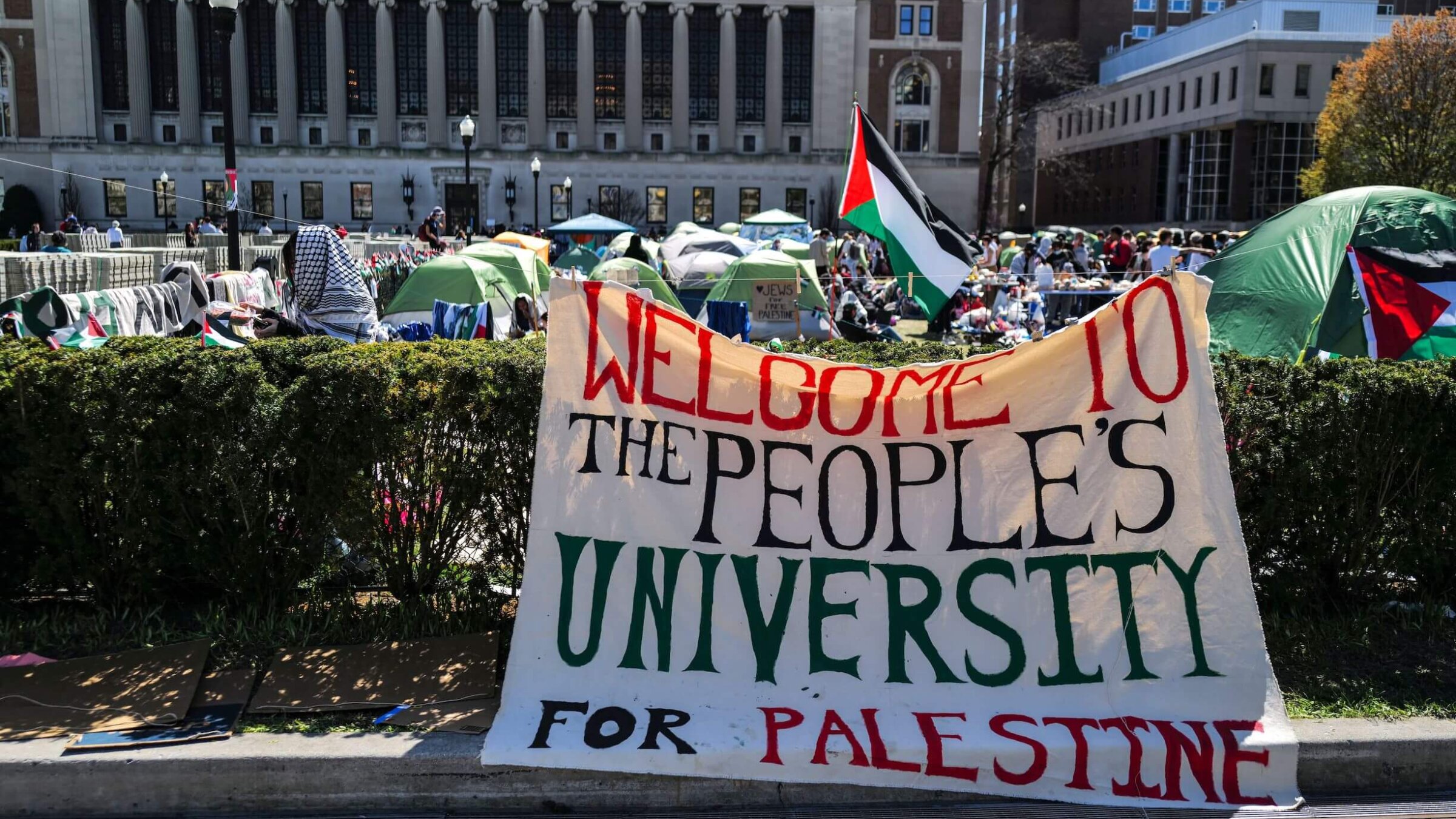Edward Said tried to erase Jews. So do the pro-Palestinian Columbia protesters citing his legacy
I studied at Columbia with Said. His anti-colonial philosophy depended in part on pretending Palestinians were the real Jews

A pro-Palestinian encampment at Columbia University. Photo by Charly TRIBALLEAU / AFP
I saw a photo of a protester at Columbia’s so-called “Gaza Solidarity Encampment” that read, “Columbia, why require me to read Prof. Edward Said if you don’t want me to use it?” It brought me back to the 1980s, when I took Said’s course on the modern novel as a Columbia undergraduate, and he was my examiner on Marxist cultural theory for my PhD comprehensive exams in English.
I did not know then what I know now: that Said had dedicated himself to the delegitimization and destruction of the state of Israel.
Said didn’t just teach students like me Conrad and Joyce: he acted as a spokesperson for the Palestinian cause in the United States. He was a confidant to the leader of the Palestine Liberation Organization, Yasser Arafat, until Arafat signed the Oslo Peace Accords, which Said opposed.
Columbia’s tenured radicals were awed by Said’s power and charisma. His students and followers — my teachers — trained generations of anti-Zionists who now occupy important roles, not just at Columbia, but also at elite universities across the U.S.. They teach not only in English departments, but also Middle Eastern studies and much of the humanities. In classrooms where reading is often reduced to criticizing instances of cultural appropriation, the only appropriations now allowed are of the Jews.
Said, who was born in Jerusalem in 1935 and died in 2003, was an accomplished pianist; a suave, cultured, celebrity critic; and a scholar best known for the book Orientalism, which became a required text in innumerable courses.
In an interview with the Israeli journalist Ari Shavit, published in Haaretz in 2000, Said claimed to be the only “true follower” of the Jewish cultural critic Theodore Adorno. Adorno was the best known of the Frankfurt School of Marxist cultural critics, Jews exiled from Nazi Germany, and the co-author of Dialectic of Enlightenment, still the most important cultural history of the Holocaust, written out of the ashes of Auschwitz.
That book argues that the slaughter happened not because reason and enlightenment were abandoned, but rather because they were realized in the rationalist efficacy of Germany’s administrative genocide of the Jews. Reason, Adorno and his co-writer, Max Horkheimer, argued, was not the salvation of society or the Jews, but the destroyer of both.
For Said, the Nazi extermination machine was reborn in Israel, with Zionism the apotheosis of enlightenment evil, Western imperialism and colonialism.
And so Said argued in that Haaretz interview that by connecting the legacy of the Nazis to Israel, he had become “the last Jewish intellectual.” Despite his admiration for Adorno, he said the elder scholar was “stunningly silent on racist theory, anti-imperialist resistance, and oppositional practice in the empire.”
“You don’t know anyone else. All your other Jewish intellectuals are now suburban squires,” he told Shavit. “From Amos Oz to all these people here in America. So I’m the last one.”
Said, who was Christian, had two tactics to erase the Jew — tactics that the Columbia protesters now citing him also employ.
First, Christian supersessionism, with a political twist. Saying “I’m the last Jewish intellectual” was him essentially saying: “I am the new Jew.” Second, appropriation through inclusion: The Jew remains, but only as a tribal remnant in a universalism for which Said is the spokesman: “we are all Jews!”
In this model, the Palestinian cause becomes the new Jesus, proclaiming freedom for all humanity.
“Let me put it this way,” Said told Shavit: “I’m Jewish-Palestinian.” But the idea that Paul wrote in Galatians — the ninth book of the New Testament — that “there is neither Jew, nor Greek” works out much better for the Greek than for the Jew.
Ditto here, for the Palestinian. Said’s new universalists fight for “justice” for everybody but the Jews. Said claimed to be the authentic Adorno; his Palestinians, not the Israelites, were the authentic Jews.
In a 1986 review of Exodus and Revolution by the Jewish historian Michael Walzer, Said warned that the true exiles were not Hebrews but Canaanites. The more “you shore up the sphere of Exodus politics,” he wrote, “the more likely it is that the Canaanite on the outside will resist and try to penetrate the walls banning them from the goods of what is, after all, partly their world too.”
The reasonableness of the claim almost erases the threat of violence — penetrating the walls, taking what is rightfully theirs. The Canaanites may pose as benevolent outsiders, but they are lawless destroyers in the Bible, child sacrificers, and Said knows this.
Yes, today, the Canaanites have penetrated the walls and our campus gates — first Columbia, with promises of more to come. Protesters at Columbia this weekend didn’t just call for the destruction of Israel. Some told Jewish students to “go back to Poland,” a left-wing version of the cry from 2017 Charlottesville — “We will replace you.” Oct. 7 will be every day.
The purveyors of death proclaim on Columbia’s South Lawn, chanting “There is no god but Allah, and the martyr is Allah’s beloved,” while hapless professors cry out “Free speech!”
On Sunday, a rabbi associated with the university’s Orthodox Union Jewish Learning Initiative told Jewish students that the campus was unsafe on campus and should go home for the Passover holiday. While the Hillel rabbi disagreed, insisting Jewish students would not be exiled from the university they attend, by Monday morning their disagreement had been made moot, as Columbia’s president canceled in-person classes and told everyone who does not live on campus to stay away.
Just like that, the Jew vanishes.
The Columbia where I studied for years, the university I loved, a community that was — humanist, tolerant, democratic is also gone.















